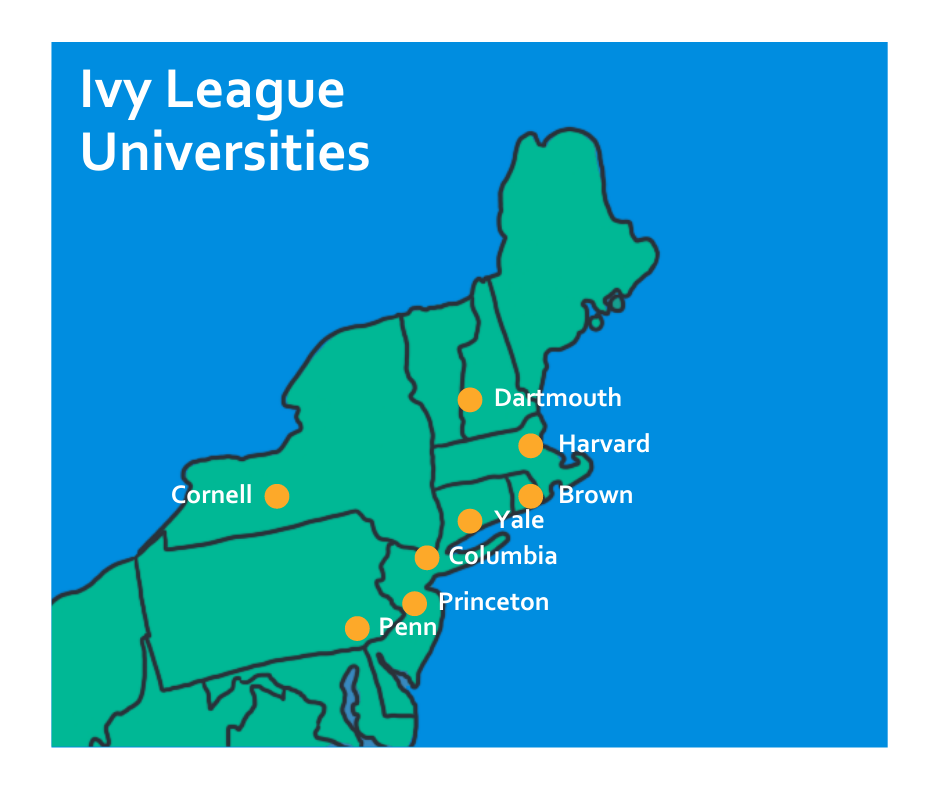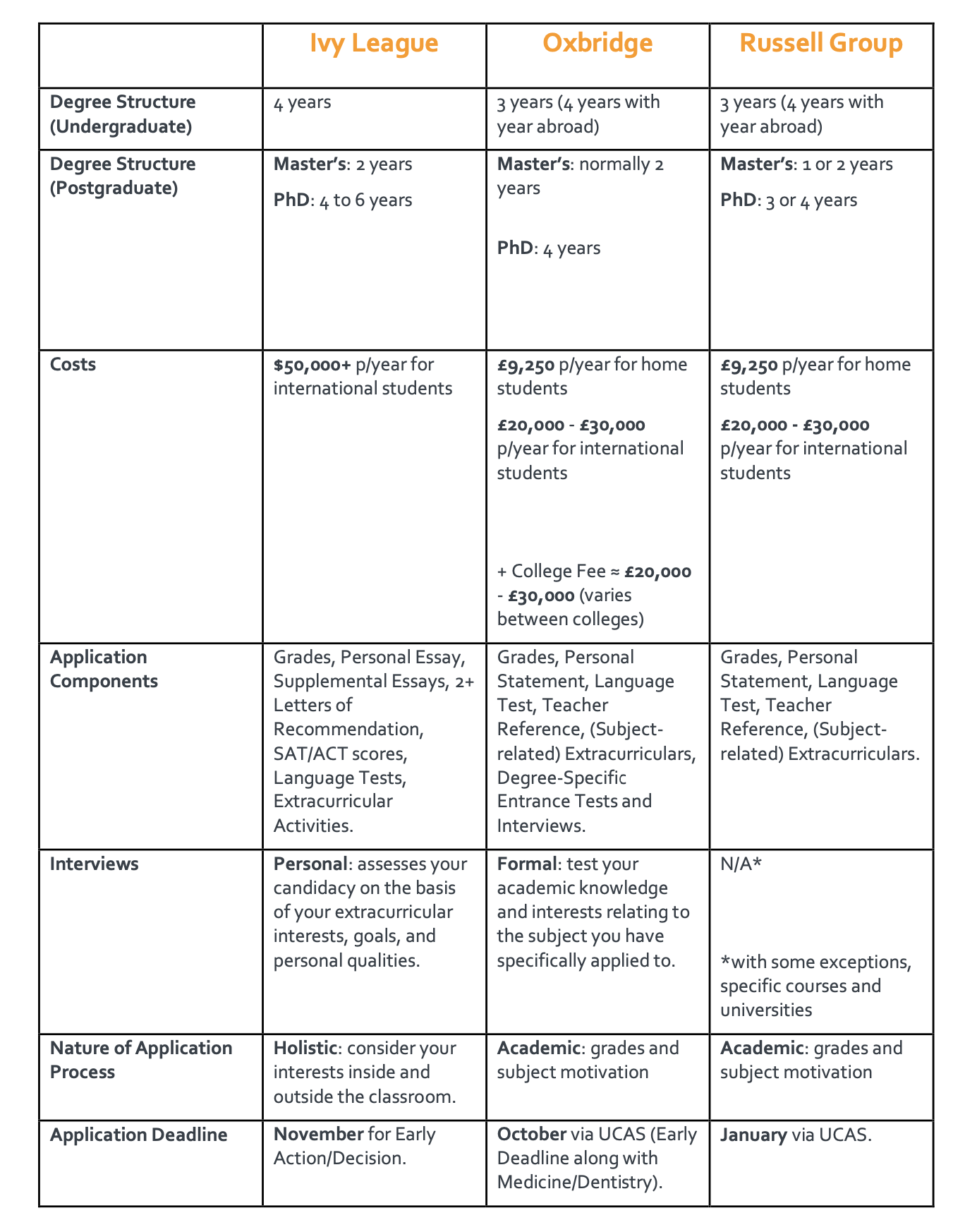Ivy League vs Oxbridge vs Russell Group: Key Differences
Ivy League vs Oxbridge vs Russell Group: Key Differences
This week we take a closer look at the key differences and similarities between the Ivy League universities in the US as compared to Oxbridge and the Russell Group universities in the UK. What’s the big deal anyways?
‘Ivy League’, ‘Oxbridge’, and ‘Russell Group’ are all common buzzwords in the sphere of higher education admissions. What do they tell us? On the surface these words are indicators of academic reputation and fame. However, the histories of these terms and the key differences between each can help you broadly analyse where you would be best suited to study abroad.
Ivy League
A powerhouse of top universities in the US which we’ve all heard the names of at least in passing, the Ivy League universities in the United States surprisingly do not originate in their shared reputations for academic excellence. A common misconception is that top universities in the US are generally classed as ‘Ivies’. The Ivy League group consists of eight universities who have historically participated in a common athletic conference by the name of the Ivy League, where 8,000 student athletes from the member universities compete each year.
Less known today by the name of the ‘ancient eight’, the Ivy League consists of:
*see end of article for sources
As such, you will have guessed by know that there are plenty of impressive non-Ivy League schools by the likes of Massachusetts Institute of Technology (QS 2021 #1 Worldwide), Stanford University (QS 2021 #2 Worldwide), and California Institute of Technology (QS 2021 #4 Worldwide). The Ivy League do however operate joint admissions and a ‘joint notification date’ to notify applicants of admissions results.
Oxbridge
The name ‘Oxbridge’ is quite self-explanatory and includes the universities of Oxford and Cambridge in England, two of the UK’s most famous, leading, and wealthy universities. Both universities are made up of colleges where applicants will have a specialised Oxbridge experience. Their historical significance dates back to 1096 and 1209 respectively, and your university experience at these institutions will be shaped by a variety of unique Oxbridge-only traditions, such as the 1:1 tutoring teaching method, college formals, and May balls.
Read more about PA community members’ experiences: Rachel on defining her experience at Oxford university (here), more about Cambridge May week (here), and the Human, Social, and Political Sciences Course (HSPS) offered at Cambridge in particular (here).
Russel Group
The Russell Group is a 24-university group of research-focussed, public universities in the UK. According to the Russell Group themselves, all 24 universities are found in the top 250 rankings worldwide. Like the Ivy League, the university group has a reputation for offering a high standard of education but does not consist solely of the highest-ranking universities in the UK. Each university has its own reputation for its independent expertise. The University of Exeter states on their website that the Russell Group shares “a common theme of collaboration that ensures that students are receiving the very best education at a university that serves the local community and conducts industry leading research.”
Read about Vinny’s first year at the University of Warwick (here) and Melis on studying in London at King’s College (here).
So what’s ‘really’ the difference?
Below we have summarised some of the notable differences between studying abroad at the various Ivy League, Oxbridge, and Russell Group universities:
Table comparing the degree structures, costs, and application processes of the Ivy League, Oxbridge, and Russell Group universities.
To read more about these differences, and in particular the relevance of social and non-academic considerations for deciding between these three groups of top global universities, visit our blog article ‘Oxbridge vs. Ivy League? The Choice Matters’ (here).
What To Choose: Key Takeaways
What’s worth highlighting is the difference in cost, university experience, and curriculum: UK universities require you to have a degree course in mind when applying for your undergraduate whilst US universities typically offer a general education to help you strive after your non-academic ambitions that stretch beyond graduating from university. The historical universities offer the most unique university experiences with the incorporation of rich traditions into your degree. The dealbreaker for many will be the variation in costs to study at each of these university types respectively. Whilst private US colleges offer generous need-based financial assistance to their successful applicants, international student degrees from UK universities tend to have lower price tags.
In any event, whether it’s at an Ivy League, Russell Group, or Oxbridge university, our established community of Project Access mentors are here to help you secure your place of admission at the university of your dreams. 77.5% of our 2019 mentees shared that they received offers from their top three universities. We offer programmes for everyone at any application stage: pre-application prep, undergraduate, and postgraduate applicants for universities in Europe, the US and UK. And I haven’t even mentioned that all of our programmes are completely free and volunteer-led! So what are you waiting for?
Written by Hanna Tong Strömberg, 2nd year LLB Law at LSE.
Do you have any topics you would especially like to see covered on our blog? People you would like to meet? Places you want to see? Send your suggestions to hanna.stromberg@projectaccess.org ✉️
Sources Cited (Admissions Statistics):
http://irp.dpb.cornell.edu/wp-content/uploads/2021/02/Profile2020_first-year.pdf
https://admissions.dartmouth.edu/apply/class-profile-testing
https://admissions.upenn.edu/admissions-and-financial-aid/what-penn-looks-for/incoming-class-profile
https://admission.princeton.edu/how-apply/admission-statistics
https://admissions.yale.edu/sites/default/files/2024classprofileweb.pdf





